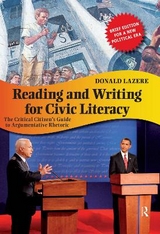
Reading and Writing for Civic Literacy
Paradigm (Verlag)
978-1-59451-085-4 (ISBN)
- Titel erscheint in neuer Auflage
- Artikel merken
'Lazere's [book] is heaven-sent and will provide a crucial link in the chain of understanding how conflicts are structured and, most importantly, how they can be rationally addressed - a healthy antidote to the scepticism that has become so pervasive in academic life.' Alan Hausman, Hunter College This innovative book addresses the need for college students to develop critical reading, writing, and thinking skills for self-defence in the contentious arena of American civic rhetoric. In a groundbreaking reconception of composition theory, it presents a comprehensive critical perspective on American public discourse and practical methods for its analysis. Exercises following the text sections and readings help students understand the ideological positions and rhetorical patterns that underlie opposing viewpoints in current controversies - such as the growing inequality of wealth in America and its impact on the finances of college students - as expressed in paired sets of readings from the political left and right. Widely debated issues of whether objectivity is possible and whether there is a liberal or conservative bias in news and entertainment media, as well as in education itself, are foregrounded as topics for rhetorical analysis.
Donald Lazere is Professor Emeritus at California Polytechnic State University and is the editor of American Media and Mass Culture: Left Perspectives.
Acknowledgments Preface to Teachers (and Curious Students) PART I: INTRODUCTION Chapter 1: An Appeal to Students Chapter 2: What Is an Argument? What Is a Good Argument? Chapter 3: Definitions and Criteria of Critical Thinking Chapter 4: Writing Argumentative Papers PART II: ATTAINING AN OPEN MIND: CRITICAL THINKING AND ARGUMENTATIVE RHETORIC Chapter 5: Viewpoint, Bias, and Fairness: From Cocksure Ignorance to Thoughtful Uncertainty Chapter 6: Questioning Culturally Conditioned Assumptions and Ethnocentrism Chapter 7: Overgeneralization, Stereotyping, and Prejudice Chapter 8: Authoritarianism and Conformity, Rationalization and Compartmentalization Chapter 9: Semantics in Rhetoric and Critical Thinking Chapter 10: Avoiding Oversimplification and Recognizing Complexity Chapter 11: Some Key Terms in Logic and Argumentation Chapter 12: Logical and Rhetorical Fallacies Chapter 13: Causal Analysis Chapter 14: Uses and Misuses of Emotional Appeal PART III: THINKING CRITICALLY ABOUT THE RHETORIC OF POLITICS AND MASS MEDIA Chapter 15: Thinking Critically About Political Rhetoric Chapter 16: Thinking Critically about Mass Media PART V: DECEPTION DETECTION Chapter 17: Special Interests, Conflict of Interest, Special Pleading Chapter 18: Varieties of Propaganda Chapter 19: Advertising and Hype PART VI: PUTTING IT ALL TOGETHER IN A LONG PAPER Chapter 20: A Case Study: The Rich, the Poor, and the Middle Class Chapter 21: Collecting and Evaluating Opposing Sources: Writing the Research Paper Chapter 22: Documentation Chapter 23: Research Resources Glossary of Rhetorical and Critical Thinking Terms Works Cited Index
| Zusatzinfo | illustrations |
|---|---|
| Sprache | englisch |
| Maße | 178 x 254 mm |
| Gewicht | 975 g |
| Themenwelt | Sozialwissenschaften ► Pädagogik |
| ISBN-10 | 1-59451-085-7 / 1594510857 |
| ISBN-13 | 978-1-59451-085-4 / 9781594510854 |
| Zustand | Neuware |
| Haben Sie eine Frage zum Produkt? |
aus dem Bereich



